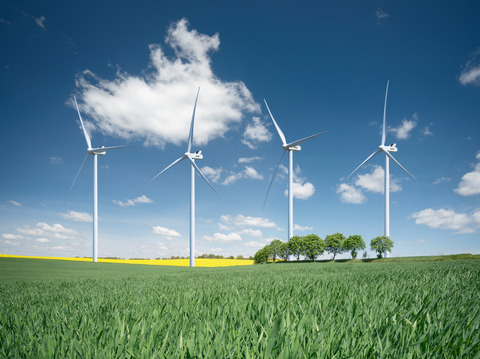New coalition of industry and academia to commercialise solution for full recyclability of wind turbine blades
A new partnership between Skrydstrup Group (iNANO & Dept. of Chemistry, Aarhus University), Vestas, Olin, and the Danish Technological Institute collides industry and research to support circularity of wind turbine blades. The CETEC project paves the way for manufacturing new blades using materials from old turbine blades, thereby creating fully recyclable wind turbines.

A coalition of industry and academic leaders have developed a novel technology to enable circularity for thermoset composites, the material used to make wind turbine blades. The new technology delivers the final technological step on the journey towards a fully recyclable wind turbine value chain. To enable the adoption of this new technology, and to advance a circular economy across the wind industry, a new initiative entitled CETEC (Circular Economy for Thermosets Epoxy Composites) has been established. Within three years, CETEC is aiming to present a fully scoped solution ready for industrial adoption, based on commercialisation of the novel circularity technology.
Partly funded by Innovation Fund Denmark (IFD), CETEC is spearheaded by Vestas, the global leader in sustainable energy solutions, and involves both industrial and academic leaders including Olin, the world leading producer of Epoxy, the Danish Technological Institute (DTI), and Aarhus University.
Developed by DreamWind, an innovation initiative driven by the same partners, the new technology consists of a two-step process. Firstly, thermoset composites are disassembled into fibre and epoxy. Secondly, through a novel chemcycling process, the epoxy is further broken up into base components similar to virgin materials. These materials can then be reintroduced into the manufacturing of new turbine blades, constituting a new circularity pathway for epoxy resin.
Wind turbines are 85-90 percent recyclable, with turbine blade material currently constituting the remaining percentage that cannot be recycled, due to the nature of thermoset composites. CETEC is aiming to close this recycling gap and enable a significant step forward in the elimination of waste across the wind energy industry.
“As global commitments to a net-zero future increase, it’s absolutely crucial to ensure the wind industry can scale sustainably, which includes Vestas fulfilling our ambition to produce zero-waste turbines by 2040. Leveraging this new technological breakthrough in chemcycling epoxy resin, the CETEC project will be a significant milestone in Vestas’ journey towards achieving this goal, and in enabling a future where landfill is no longer required in blade decommissioning,” said Allan Korsgaard Poulsen, Head of Sustainability and Advanced Materials, Vestas Innovation and Concepts.
“The key characteristic of composite materials is their unique combination of low weight and high strength. This is governed by the strong bonding of two different materials – fibre and epoxy. The dilemma is that this strong bond is also the feature that renders these materials difficult to recycle. Therefore, the development of CETEC’s novel technology, enabling disassembly of the composite at end-of-life, is a gamechanger, that will allow us to capture the value represented by each material stream in a new circular value chain”, said Simon Frølich, Team Manager, PhD, Danish Technological Institute.
"Chemcycling of epoxy-based materials would allow deconstructing these highly stable polymer chains into molecular building blocks. These building blocks are easily processable and can be utilised to produce new epoxy, which will have the same quality as the original material. Avoiding the loss of valuable molecular complexity in such a way is a highly desirable concept and an important step to sustainable materials," said Prof. Dr. Troels Skrydstrup, Aarhus University.
CETEC’s solution holds significant potential for commercial value capture, particularly in markets where regulation around waste management for manufacturing industries is tightening to serve a broader sustainability agenda. When fully developed, the solution may also have an impact for other industries that rely on thermoset composite in production, such as automotive and aviation.
“As the leading Epoxy producer and global supplier for the wind industry, Olin is proud to provide our technological expertise to this important sustainability project,” said Leif Ole Meyer, TS&D Leader EMEAI at Olin. “To develop technologies which close an existing gap of thermosets by creating a circularity is yet another example of putting our Resource Efficiency sustainability goal into action. This innovation will help the industry to minimize consumption of virgin material sources and increase the reuse and recycling of materials.”
See original press release by VESTAS here.
For more information, please contact:
Professor Troels Skrydstrup
Department of Chemistry & Interdisciplinary Nanoscience Center (iNANO)
Aarhus University
Email: ts@chem.au.dk
